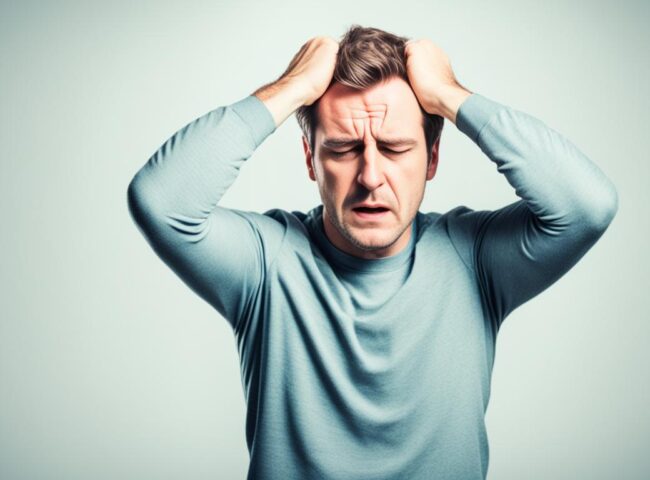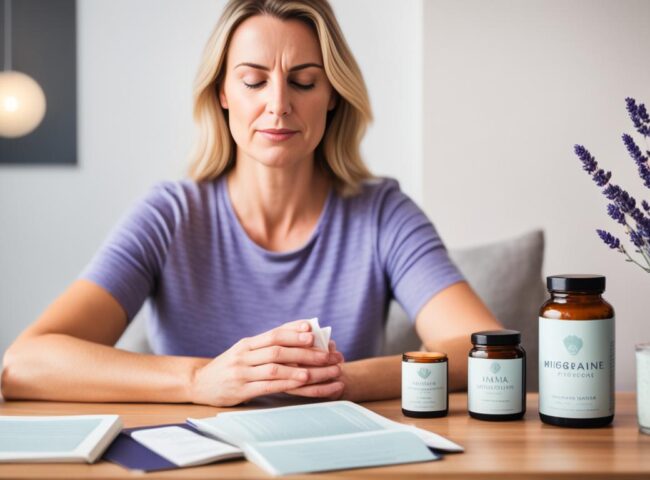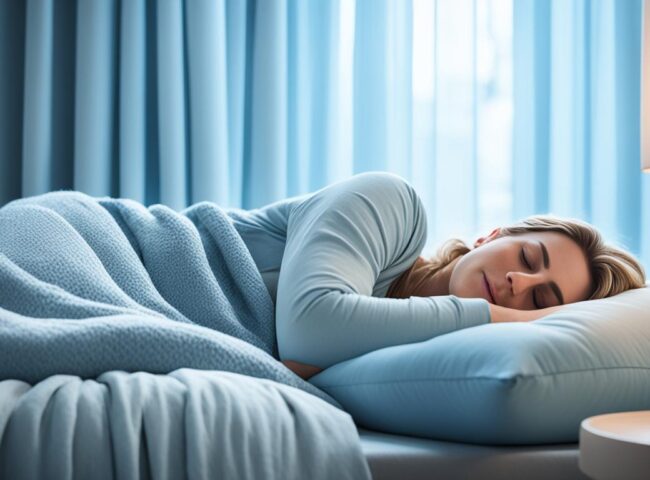I’ve struggled with anxiety myself, and I know how tough it can be. Anxiety affects millions of people around the world. This guide will cover the types of anxiety, symptoms, triggers, and ways to cope. We’ll help you take back control of your mental health.
Anxiety is a normal reaction to stress but can become overwhelming. It can show up as mild nerves or severe panic attacks. If it stops you from living your life, you might have an anxiety disorder. Knowing the types, like generalized anxiety or social anxiety, helps you manage it better.
Key Takeaways
- Anxiety is a common mental health condition that affects millions of people worldwide.
- Anxiety disorders cause physical, emotional, and cognitive symptoms that disrupt daily life.
- Identifying personal triggers and coping strategies is key to managing anxiety.
- Professional help, like cognitive behavioral therapy and medication, can greatly benefit those with anxiety.
- Stress-reducing techniques, such as mindfulness and meditation, can ease anxiety symptoms.
Understanding Anxiety: A Comprehensive Overview
Anxiety is a normal feeling we all get sometimes. It’s how our body reacts to stress or danger. But for some, it can get too much and affect everyday life. Knowing about anxiety and its forms is key to finding ways to cope.
What is Anxiety?
Anxiety is a condition that makes you feel worried, scared, or nervous a lot. It shows up in your mind and body, like racing thoughts, feeling restless, and tight muscles. It’s a natural response, but if it gets too much, it’s called an anxiety disorder.
Types of Anxiety Disorders
There are many kinds of anxiety disorders, each with its own set of signs and traits:
- Generalized Anxiety Disorder (GAD): This means always worrying too much about different things, like work, health, or family.
- Social Anxiety Disorder: This is being really scared or anxious in social situations, fearing being judged or embarrassed.
- Panic Disorder: This is having sudden and unexpected panic attacks that make you feel your heart race, sweat, and shake.
- Phobias: These are irrational fears of certain things or situations, like heights, animals, or being around people.
Knowing the different kinds of anxiety disorders helps people see what they’re up against. This makes it easier to find the right treatment and ways to handle it.

Recognizing the Signs: Anxiety Symptoms Unveiled
Knowing the signs of anxiety is key to handling this common mental health issue. It covers both physical and emotional signs. This knowledge helps people spot when they’re having an anxiety episode and get help. We’ll look at the many symptoms of anxiety to help you manage your mental health better.
Physical Symptoms of Anxiety
Anxiety shows up in many physical ways that can surprise people. Some common physical signs include:
- Rapid heartbeat or palpitations
- Shortness of breath or difficulty breathing
- Sweating or feeling clammy
- Trembling or shaking
- Muscle tension or pain
- Gastrointestinal issues, such as nausea or stomach discomfort
These physical signs can be scary and might feel like a panic attack is coming. Knowing they’re signs of anxiety helps people take steps to manage it.
Emotional and Cognitive Symptoms
Anxiety also affects emotions and thoughts deeply. Common emotional and cognitive signs are:
- Persistent feelings of worry, fear, or dread
- Difficulty concentrating or focusing on tasks
- Irritability or mood swings
- Restlessness or feelings of being on edge
- Irrational or intrusive thoughts
- Avoidance of certain situations or activities
These signs can make daily life hard and affect how well you function. Spotting them is the first step to getting help and finding ways to cope.
| Symptom | Description |
|---|---|
| Rapid Heartbeat | A pounding or racing heartbeat, often experienced during anxiety episodes. |
| Persistent Worrying | Intrusive, irrational thoughts that can be difficult to control or silence. |
| Muscle Tension | Tightness or discomfort in the muscles, often in the neck, shoulders, or back. |
| Difficulty Concentrating | Inability to focus or maintain attention on tasks due to anxiety-related distractions. |
Understanding anxiety’s many symptoms helps people start managing it and improving their mental health. Spotting these signs lets you seek help and find ways to cope.

Physical Manifestations of Anxiety
Anxiety shows up in many physical symptoms that can be really tough. You might feel your heart racing, start sweating, or get muscle tension and dizziness. These physical signs of anxiety can really affect how we feel overall. It’s key to know about these symptoms to help manage anxiety better.
Common Physical Symptoms
- Chest pain or discomfort, often mistaken for a heart attack
- Shortness of breath or a feeling of being unable to catch one’s breath
- Muscle tension, especially in the neck, shoulders, and back
- Trembling or shaking, especially in the hands or body
- Dizziness, lightheadedness, or a feeling of losing balance
- Sweating, either profuse or clammy
- Nausea or digestive issues
When to Seek Medical Attention
Many of these physical symptoms are common with anxiety. But, it’s key to know when you should see a doctor. If you have ongoing or severe chest pain, trouble breathing, or other symptoms that worry you, get medical help. A doctor can check for any health issues and help with your anxiety.
“Recognizing and addressing the physical symptoms of anxiety is an important step in managing this condition effectively.”

Emotional and Cognitive Symptoms of Anxiety
Anxiety affects not just our bodies but also our feelings and thoughts. It’s important to see how it changes our emotional and mental states.
One key emotional sign of anxiety is worry. People with anxiety often think a lot about bad things that might happen. This constant worry can make it hard to live in the moment and enjoy simple things.
Fear is another emotional sign. Anxiety makes people feel very scared and careful, even when there’s no real danger. This fear can make them avoid things, which makes the anxiety worse.
Anxiety also makes people irritable. They might get easily upset, quick to anger, and react too strongly to small problems. This irritability can hurt relationships and make it hard to keep a peaceful home or work life.
Anxiety also affects how we think. It makes difficulty concentrating a big problem. This can make it hard to do tasks, leading to feeling overwhelmed and less productive.
| Emotional Symptoms | Cognitive Symptoms |
|---|---|
|
|
Knowing about these emotional and cognitive symptoms of anxiety helps people start to deal with it. They can find ways to cope and feel better.

Anxiety Triggers: Identifying Your Personal Stressors
Knowing what triggers your anxiety is key to managing it. We’ll look at common triggers and why it’s important to understand your own stressors.
Common Anxiety Triggers
Many things can trigger anxiety, like big life events, relationships, work, and health issues. Some common triggers are:
- Significant life changes, such as a job loss, relocation, or the death of a loved one
- Interpersonal conflicts or difficulties in relationships
- High-pressure work environments or career-related stress
- Concerns about physical health, such as chronic illness or medical procedures
Developing Self-Awareness
Understanding your unique anxiety triggers is crucial. Take time to think about your thoughts, feelings, and actions. Look for patterns that make you anxious. Keeping a journal can help you see what leads to your anxiety and how you react.
This self-reflection can give you important insights. It helps you find ways to cope with your anxiety better.

“The first step toward change is awareness. The second step is acceptance.” – Nathaniel Branden
Coping Strategies: A Toolbox for Managing Anxiety
Feeling overwhelmed by anxiety? You’re not alone. There’s a toolbox of coping strategies to help you regain control and find relief. Let’s look at some effective techniques to help you deal with anxiety.
Relaxation Techniques
Relaxation techniques are a powerful tool for managing anxiety. Deep breathing can calm your mind and body by slowing your heart rate and easing muscle tension. Progressive muscle relaxation, where you tense and release muscle groups, can also help manage anxiety.
- Practice deep breathing: Inhale slowly through your nose, hold for a few seconds, then exhale slowly through your mouth.
- Engage in progressive muscle relaxation: Tense and release each muscle group, from your toes to your head, to release physical tension.
Cognitive Behavioral Therapy (CBT)
Cognitive Behavioral Therapy (CBT) is a great way to handle anxiety. It helps you spot and challenge negative thoughts that make you anxious. By changing these thoughts, you can stop the cycle of anxiety and find better ways to cope.
“CBT has helped me replace my anxious thoughts with a more rational perspective. It’s been a game-changer in my journey to manage my anxiety.” – Sarah, 32
Whether you like relaxation techniques or cognitive-behavioral therapy, adding these strategies to your daily life can really help. Finding the right tools for you is important for your mental health.

The Role of Mindfulness and Meditation
Mindfulness and meditation are key in fighting anxiety. They help us stay in the moment, lower stress, and improve our mental health. This is crucial for handling anxiety better.
Mindfulness means being fully in the present, without judgment. It teaches us to focus on now, not past or future worries. This helps us see what makes us anxious and deal with it better.
Meditation goes hand in hand with mindfulness. It uses deep breathing and guided images to relax us. Regular meditation lowers stress hormones, making us feel better overall.
Adding mindfulness and meditation to our daily life can change how we handle anxiety. These practices give us control over our thoughts and feelings. This helps us stay strong and calm in tough times.
“Mindfulness is not about thinking, it’s about not thinking.”
– Jiddu Krishnamurti
By using mindfulness and meditation, we gain tools to handle anxiety. This helps us connect with ourselves better and feel mentally well.

Building a Support System: Friends, Family, and Professionals
Dealing with anxiety can get easier with a strong support network. Connecting with loved ones and getting professional help can boost your well-being. It gives you the tools to handle anxiety better.
Friends and family play a huge role in your support system. Talking to them about your feelings can make you feel less alone. They can offer emotional support, help with practical tasks, and just listen when you need it.
Also, mental health experts are key in fighting anxiety. Counseling and therapy can teach you coping skills and help you understand your anxiety better. Working with therapists or counselors can change your life for the better.
Building a Supportive Network
- Reach out to close friends and family members, sharing your experiences and needs.
- Participate in support groups, either in-person or online, to connect with others facing similar challenges.
- Explore community resources, such as local mental health organizations or support services.
Seeking Professional Help
- Consult with your primary care physician to discuss your anxiety and get a referral to a mental health professional.
- Research and compare different types of mental health providers, such as therapists, counselors, or psychologists, to find the best fit for your needs.
- Be open and honest with your mental health professional, as this will allow them to provide the most effective care and support.
Building a strong support system and getting help from mental health experts are key steps to manage your anxiety. Remember, you don’t have to face this alone.

Lifestyle Changes for Anxiety Management
Making lifestyle changes can greatly help manage anxiety. By focusing on both physical and nutritional health, we can take a full approach to better our well-being.
Exercise and Physical Activity
Regular exercise is a great way to lessen anxiety. It releases endorphins, making us feel good and lowering stress. Activities like walking, jogging, swimming, or yoga are great for those with anxiety.
- Aim for at least 30 minutes of moderate exercise most days of the week.
- Choose activities that you enjoy to increase the likelihood of sticking to a routine.
- Incorporate a mix of aerobic, strength-training, and flexibility exercises.
Nutrition and Dietary Considerations
Eating well is key to managing anxiety. Some foods and nutrients can boost mood and lower stress. Adding these to your meals can help with anxiety.
- Focus on whole, unprocessed foods rich in complex carbohydrates, lean proteins, healthy fats, and essential vitamins and minerals.
- Limit your intake of caffeine, alcohol, and sugary foods, as these can make anxiety worse.
- Stay hydrated by drinking plenty of water throughout the day.
| Nutrient | Benefits for Anxiety |
|---|---|
| Omega-3 fatty acids | Reduce inflammation and promote brain health |
| Magnesium | Helps regulate the stress response and support muscle relaxation |
| Vitamin B6 | Contributes to the production of neurotransmitters that affect mood |
By making these lifestyle changes, you can actively work on managing your anxiety and enhancing your health. It’s not just about treating symptoms. It’s about finding the root causes and living a healthier, balanced life.

anxiety symptoms, anxiety treatment, mental health
Dealing with anxiety can feel overwhelming, but there’s hope for relief and control. We’ll cover common symptoms, treatment options, and mental health resources. This will help those seeking help.
Understanding Anxiety Symptoms
Anxiety shows up in many ways, physical, emotional, and mental. Common symptoms include:
- Excessive worrying and rumination
- Feelings of restlessness and irritability
- Difficulty concentrating and making decisions
- Muscle tension and physical discomfort
- Rapid heart rate and shallow breathing
- Difficulty sleeping and fatigue
Knowing these symptoms is key to tackling anxiety and finding the right treatment.
Exploring Anxiety Treatment Options
There are many ways to manage anxiety:
- Psychotherapy, like Cognitive Behavioral Therapy (CBT), changes negative thought patterns.
- Medication, given by a mental health expert, helps with specific symptoms.
- Lifestyle changes, like exercise and stress management, are also important.
Usually, a mix of these methods works best, based on what the person needs and likes.
Mental Health Resources and Support
Getting support is crucial for managing anxiety. Here are some good options:
- Talking to a therapist or counselor who knows about anxiety
- Joining a support group, online or local, to share and learn from others
- Using self-help tools, like books, apps, and websites, on anxiety
- Getting help from a healthcare provider or hotline for advice and resources
You don’t have to deal with anxiety by yourself. By reaching out and finding the right support, you can start on the road to a better life.
“Anxiety is not something you just ‘get over,’ but it is something you can learn to manage and overcome.” – Unknown
Seeking Professional Help: When and Where to Start
If anxiety doesn’t go away or gets worse, getting help from professionals can really help. Mental health experts like therapists, counselors, and psychologists offer support and treatments. These treatments are based on science and can make a big difference.
Types of Mental Health Professionals
Many mental health professionals can help with anxiety:
- Therapists are experts in psychotherapy. They help people understand their feelings and behaviors to find ways to cope.
- Counselors provide advice, support, and solutions for mental health issues, including anxiety.
- Psychologists have advanced degrees in psychology. They know about psychological tests, making diagnoses, and therapies like cognitive-behavioral therapy (CBT).
Finding the Right Therapist
Finding the right therapist for anxiety is key. Here are some tips to help you:
- Think about what you want from therapy, like the type of therapy or therapist qualities.
- Get recommendations from your doctor, friends, or mental health groups.
- Look into therapists’ qualifications, their knowledge in anxiety, and their experience.
- Have a first meeting to see if you feel okay with the therapist.
- It might take a few tries to find the right therapist, so don’t give up.
Looking for professional help is a brave step towards managing your anxiety. With the right support, you can find ways to better your mental health and happiness.
“The journey of a thousand miles begins with a single step.” – Lao Tzu
Conclusion
Managing anxiety is a journey, not a destination. We’ve learned a lot about anxiety, from its symptoms to its triggers. This knowledge helps us improve our mental health and overall well-being.
We looked at coping strategies like relaxation techniques and cognitive behavioral therapy. We also explored how lifestyle changes, such as exercise, nutrition, and mindfulness, can help. These tools help us control our anxiety and live a more balanced life.
Anxiety can feel overwhelming, but we can face it with kindness, self-awareness, and support. Understanding our stressors and building a strong support system helps us deal with anxiety better. With these steps, we can overcome anxiety with resilience and hope.







Leave feedback about this